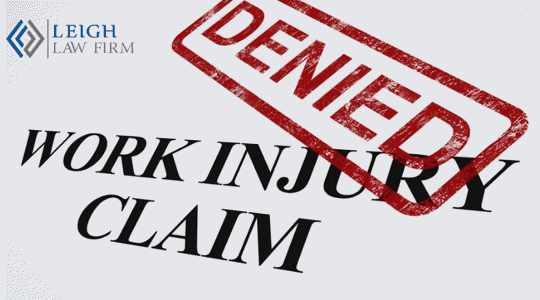Workers' compensation claims can be an essential lifeline for injured workers, providing financial support during their recovery. However, it is disheartening to know how many workers’ comp claims are denied by insurance companies. According to insurance groups, approximately 25% of these claims face initial denials. Shockingly, many of these denials lack justification and are simply tactics employed by insurers, hoping that claimants will become discouraged and abandon their pursuit of compensation. It is crucial not to let such a denial deter you. To better equip yourself for potential challenges and denials from insurance companies, it is important to understand the common reasons why workers' compensation claims are denied and their legal validity. By being informed and prepared, you can effectively navigate the claims process and take appropriate steps to address a denied workers' comp claim, ensuring that your rights are protected and that you have a fair chance to pursue the benefits you deserve. |
5 Common Reasons for Workers’ Comp Denials
Leigh Law Firm in San Diego, California wants you to be ready for anything as your workers’ compensation claim develops. We have compiled a quick list of reasons for denials that we often see when working on workers’ compensation appellate cases. The reasons on this list are not necessarily the most common across the country, but they won’t be considered rare or unusual anywhere.
Out-of-Network Medical Care
Your workers’ compensation coverage provided through your employer’s policy might require you to see a specific doctor or medical group after being hurt at work. Depending on the state you call home, you might always have to see an in-network medical professional or only see them for the first round of medical care.
Denials often happen because an injured worker sees a doctor of their own choosing when they were supposed to see one within the insurance company’s network. Even if your doctor is guaranteed to understand your injury or illness better, you should still pay attention to your workers’ comp policy requirements and see the right doctor. In many situations, you can choose to see your doctor after initial treatments, so you can discuss any concerns or worries with them about your previous treatments then.
Preexisting Medical Conditions
Insurance companies love to blame workplace injuries on preexisting conditions. An employee fell off a ladder and hurt their back? Don’t be surprised if the responding insurer tries to argue that their backaches are from a car accident that they had 12 years ago.
Unfortunately, many people do have preexisting health conditions. You probably have one to some degree or another. A preexisting condition is not meant to be an automatic disqualifier, though, as insurance companies like to use them. To make certain that a preexisting condition is not blown out of proportion and used to deny a workers’ compensation claim, you should work with an attorney who will know how to use your medical records to show the extent of your injuries from a workplace accident. Also, your attorney will need to be able to argue that an exacerbated preexisting condition is a valid injury to consider for your workers’ comp case.
Paperwork Delay
Clerical errors might seem innocuous, but they can be the sole reason for a workers’ compensation claim denial. Mixing up paperwork or missing a deadline will practically guarantee a denial because insurance companies will follow the rules to the letter if it benefits them. You could miss a filing date by one day due to circumstances outside of your control, and the insurer will still block your claim like the filing date had been missed by a year.
Don’t give the insurance company a chance to deny your claim based on a clerical error. Let a local workers’ comp attorney help you with your claim from the start, so you can be sure not to miss any important filing dates or leave any documents unfinished.
Horseplay or Intentional Neglect
Workers’ compensation only covers workplace accidents that lead to unintended injuries. If you were engaging in horseplay at work, and you were hurt because you were messing around, then your workers’ compensation claim could be legally denied by the insurer. Imagine that you were trying to “walk” a ladder to impress your coworkers when it tipped over and fell. If the insurance company learned that you were intentionally breaking safety protocols when you were hurt, then it would certainly deny your claim.
It is important to not let insurance companies misconstrue intentionality for liability, though. You can be responsible for your injuries and still be eligible for workers’ compensation as long as you were not acting with intentional neglect. In other words, you can be the sole party liable for your workplace accident and still be able to get workers’ comp benefits. Many workplace accidents don’t involve other people, so this situation is more common than it might seem.
Legal & Insurance Company Challenges
The last common reason for workers’ compensation denials on our list is perhaps the most frustrating: legal and insurance company interferences. Every workers’ compensation claim is unique, so there is always the chance that some wrinkle in the law could crop up in your case and make it more difficult to get the compensation you deserve.
Or, more commonly, the insurer could act less than cooperative to make it more frustrating to complete the claim. For example, if the insurance company has 30 days to respond to an inquiry sent by your attorney, then they might wait until the 30th day to reply, just because they can. The goal is to get the claimant to give up, effectively denying their claim without officially doing it.
Need Legal Help in San Diego?
If your workers’ compensation claim has been denied and you don’t know what to do next, the Leigh Law Firm in San Diego can help you. We have built our careers on helping the wrongfully injured and challenging major insurance companies that get in the way of their recoveries. Let us see if we can help you by discussing your case during a free consultation!

